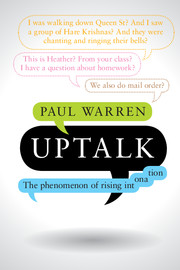Book contents
- Frontmatter
- Dedication
- Contents
- List of figures
- List of tables
- Preface
- Acknowledgements
- List of symbols and abbreviations
- 1 Introduction – why ‘uptalk’?
- 2 The forms of uptalk
- 3 The meanings and functions of uptalk
- 4 Uptalk in English varieties
- 5 Origins and spread of uptalk
- 6 Social and stylistic variation in uptalk use
- 7 Credibility killer and conversational anthrax: uptalk in the media
- 8 Perception studies of uptalk
- 9 Uptalk in other languages
- 10 Methodology in uptalk research
- 11 Summary and prospect
- References
- Index
Preface
Published online by Cambridge University Press: 05 December 2015
- Frontmatter
- Dedication
- Contents
- List of figures
- List of tables
- Preface
- Acknowledgements
- List of symbols and abbreviations
- 1 Introduction – why ‘uptalk’?
- 2 The forms of uptalk
- 3 The meanings and functions of uptalk
- 4 Uptalk in English varieties
- 5 Origins and spread of uptalk
- 6 Social and stylistic variation in uptalk use
- 7 Credibility killer and conversational anthrax: uptalk in the media
- 8 Perception studies of uptalk
- 9 Uptalk in other languages
- 10 Methodology in uptalk research
- 11 Summary and prospect
- References
- Index
Summary
This book provides an overview of a rising form of intonation, widely but not universally known as uptalk. This label refers to a rather innovative use of rising intonation on declarative utterances. Uptalk has become a topic of public discussion and of linguistic research in the latter part of the twentieth century, and is now frequently encountered in a range of varieties of English, as well as in other languages. The focus in this book will be primarily on English, and will include discussion of varieties of English, since these vary in the nature of their intonation patterns and in the shape and role of uptalk in their intonational inventory. It will nevertheless also include discussion of uptalk in languages other than English.
Uptalk is perceptually salient because although rising intonation is typically (and somewhat naively) associated with questions rather than statements in English, uptalk is the use of rising intonation in contexts where questions would not usually be expected. This salience means that it has received considerable attention, both from expert researchers and from the general public. Media commentary on uptalk has been highly speculative and often condemnatory, associating uptalk with uncertainty and insecurity among younger speakers, who are the more typical users of this form of intonation, and blaming the increasing incidence of uptalk on the influence of youth culture and in some cases even specifically on Australian soap operas. However, we will see that the meanings conveyed by uptalk intonation are more complex than a simple association of rises with questions, that the interpretation of uptalk depends on social factors as well as linguistic ones, and that uptalk plays an important role in tracking the listener's comprehension and in maintaining a constructive relationship between conversational partners.
Twenty-five years ago, an early review of uptalk-type intonation in Australian English (Guy and Vonwiller, 1989) posed three questions that were current in the debate at that time: What does this form of intonation mean? Is it changing and spreading? Who uses it? These questions remain relevant today, along with many others that have emerged since in both public debate and scientific research.
- Type
- Chapter
- Information
- UptalkThe Phenomenon of Rising Intonation, pp. xiii - xivPublisher: Cambridge University PressPrint publication year: 2016



